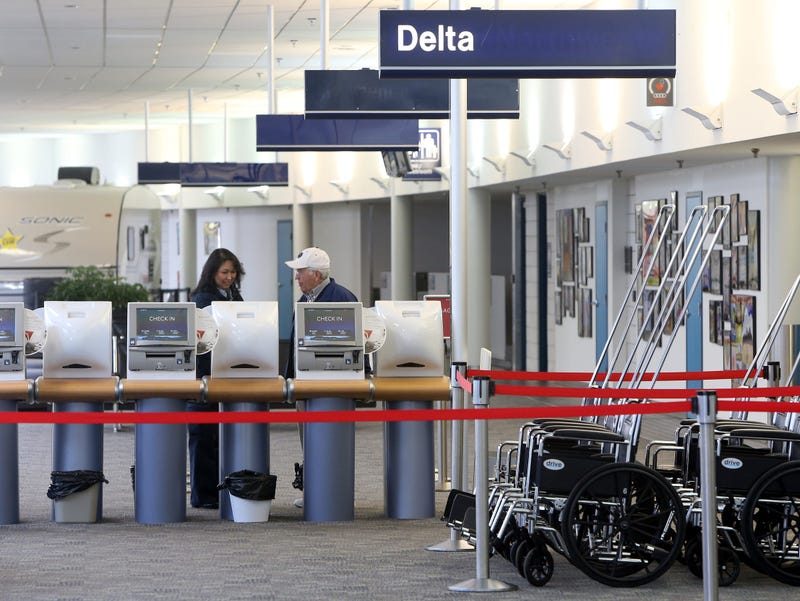
Delta Air Lines pulled its guidance for 2025 Wednesday as the trade war scrambles expectations for business and household spending and depresses bookings across the travel sector.
“With broad economic uncertainty around global trade, growth has largely stalled,” CEO Ed Bastian said in a statement on Wednesday. “In this slower-growth environment, we are protecting margins and cash flow by focusing on what we can control. This includes reducing planned capacity growth in the second half of the year to flat over last year while actively managing costs and capital expenditures.”
Although flights overseas are still selling strong, it's domestic flights that will be minimized says Kyle Potter who is with the Minnesota-based travel website Thrifty Traveler.
"Flying within the United States as well as up to Canada, down to Mexico, that's where they're starting to see some trouble of, kind of everyday travelers as well as corporate travelers who are putting off booking those trips," Potter says.
Those cuts shouldn't have a massive effect on MSP Airport however.
"I wouldn't think so, but I don't want to rule that out either," Potter explains. "Especially, you know, if this does take a couple of weeks and if the trade war and the economic uncertainty, especially in the stock market, continues to drag on or gets even worse, the changes that Delta makes could be even worse than what they indicated today."
Potter adds that the current trade war has created a lot of uncertainty for travelers.
"Most people are saying, 'I don't know that I feel confident about booking a flight right now.' You know, for the first time since the depths of the pandemic, airlines can't bank on filling their planes, and when they can't bank on filling their planes, they're not just going to eat the losses," he says. "They're going to cut back and shift those planes to fly elsewhere where they can rely on filling those planes and making a profit."
In the first quarter, Delta earned $240 million, or 37 cents per share. A year earlier it earned $37 million, or 6 cents per share. Minneapolis-St. Paul is one of several Delta hubs and accounts for approximately 70% of the passenger traffic out of MSP Airport.
Stripping out one time costs and benefits, earnings were 46 cents per share. That’s better than the 40 cents per share analysts polled by Zacks Investment Research predicted.
Yet shares of Delta Air Lines Inc. declined before the opening bell and the sector has been battered this year as investors, anticipating trouble from rising tariffs, put their money elsewhere. Shares are down 41% this year for the nation’s most profitable airline, which is better than rivals American and United.
Quarterly operating revenue climbed to $14.04 billion from $13.75 billion, beating Wall Street’s estimate of $13.81 billion.
The average fuel price per gallon declined to $2.47 from $2.79.
Delta cut its first-quarter earnings and revenue outlook last month, saying at the time that a recent decline in consumer and corporate confidence amid growing uncertainty over the economy was weakening domestic demand.
Delta said in March that it expected first-quarter revenue to rise between 3% and 4% compared with a year earlier, down from projections of 7% and 9%.
In January, Delta released fourth-quarter results that topped Wall Street’s profit and revenue estimates, as the company benefited from strong demand during the crucial holiday period.
Yet conditions have deteriorated since then with a burgeoning trade war leaving consumers and businesses unsure about what comes next. Both have begun to pull back on spending, and that includes travel.
Bastian said Delta foresees June quarter profitability of $1.5 to $2 billion but will not update its full-year outlook “given the lack of economic clarity.”
The airline previously said that it expected 2025 earnings of more than $7.35 per share and free cash flow of more than $4 billion. At the time the company was expecting strong travel demand to continue, and that has clearly changed.
A month ago Bastian was confident enough to stick by Delta’s guidance for the year. Speaking at the JPMorgan Industrial Conference, the executive said at the time that Delta was feeling good about where it was at.
“There’s nothing that we’ve been through these last couple of months to indicate there’s any cracks in any of this,” he said. “We anticipate margins continuing to expand and we think margins will expand this year, even with the slower start to the year.”
Yet uncertainty over U.S. trade policy has rattled companies in every economic sector since then.
For the second quarter, the airline is looking for earnings between $1.70 and $2.30 per share, with total revenue down 2% to up 2%. Analysts surveyed by FactSet predict earnings of $2.21 per share.
“2025 is playing out differently than we expected at the start of the year,” Delta President Glen Hauenstein said. “As a result, we are adapting to current conditions while staying true to our long-term strategy.”
The Associated Press contributed to this story.
